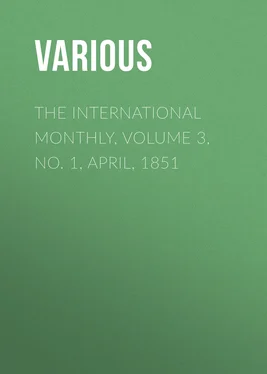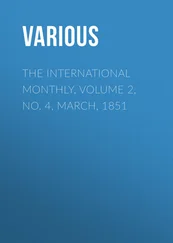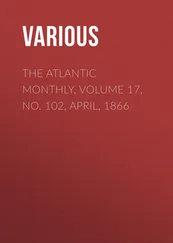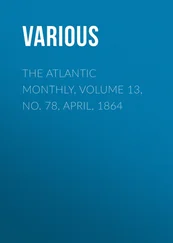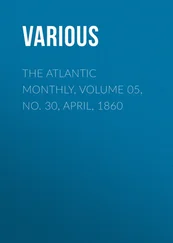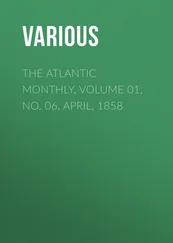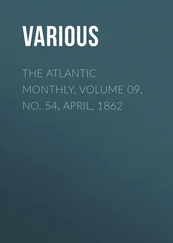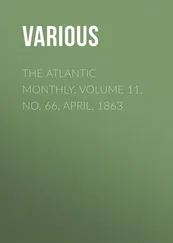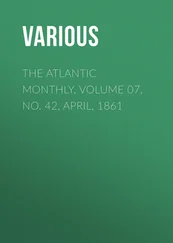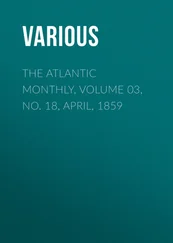Various - The International Monthly, Volume 3, No. 1, April, 1851
Здесь есть возможность читать онлайн «Various - The International Monthly, Volume 3, No. 1, April, 1851» — ознакомительный отрывок электронной книги совершенно бесплатно, а после прочтения отрывка купить полную версию. В некоторых случаях можно слушать аудио, скачать через торрент в формате fb2 и присутствует краткое содержание. Жанр: foreign_antique, periodic, foreign_edu, на английском языке. Описание произведения, (предисловие) а так же отзывы посетителей доступны на портале библиотеки ЛибКат.
- Название:The International Monthly, Volume 3, No. 1, April, 1851
- Автор:
- Жанр:
- Год:неизвестен
- ISBN:нет данных
- Рейтинг книги:3 / 5. Голосов: 1
-
Избранное:Добавить в избранное
- Отзывы:
-
Ваша оценка:
- 60
- 1
- 2
- 3
- 4
- 5
The International Monthly, Volume 3, No. 1, April, 1851: краткое содержание, описание и аннотация
Предлагаем к чтению аннотацию, описание, краткое содержание или предисловие (зависит от того, что написал сам автор книги «The International Monthly, Volume 3, No. 1, April, 1851»). Если вы не нашли необходимую информацию о книге — напишите в комментариях, мы постараемся отыскать её.
The International Monthly, Volume 3, No. 1, April, 1851 — читать онлайн ознакомительный отрывок
Ниже представлен текст книги, разбитый по страницам. Система сохранения места последней прочитанной страницы, позволяет с удобством читать онлайн бесплатно книгу «The International Monthly, Volume 3, No. 1, April, 1851», без необходимости каждый раз заново искать на чём Вы остановились. Поставьте закладку, и сможете в любой момент перейти на страницу, на которой закончили чтение.
Интервал:
Закладка:
Original Poetry
MUSIC
Music, how strange her power! her varied strains
Thrill with a magic spell the human heart.
She wakens memory—brightens hope—the pains,
The joys of being at her bidding start.
Now to her trumpet-call the spirit leaps;
Now to her brooding, tender tones it weeps.
Sweet music! is she portion of that breath
With which the worlds were born—on which they wheel?
One of lost Eden's tones, eluding death,
To make man what is best within him feel!
Keep open his else sealed up depths of heart,
And wake to active life the better part
Of his mixed nature, being thus the tie
That links us to our God, and draws us toward the sky!
Authors and Books
In a late number of the Archives for Scientific Information Concerning Russia , a Russian publication, are some interesting facts upon the colonization of Siberia, and its present population. It seems that that country began to be settled in the reign of the Czar Alexis Michaelowich, who issued a law requiring murderers, after suffering corporeal punishment and three years' imprisonment, to be sent to the frontier cities, among which the towns of Siberia were then included. Indeed, under the Empress Elizabeth Petrowna (1741—1761), the whole of Southern Siberia was called the Ukraine. The beginning of regular transportation to Siberia was made by the Czar Theodore Alexeiwich, who ordered in 1679 that malefactors should be sent with their families to settle in Siberia. About this time many serfs escaped to Siberia from service in Europe, and stringent measures were adopted to reclaim the fugitives, and prevent such an offence from being repeated and continued. In 1760 a ukase was issued permitting landlords and communes to send to Siberia, and have entered as recruits, all persons guilty of offences of any kind or degree. In 1822 another ukase allowed the crown serfs of the provinces of Great Russia to emigrate to Siberia, where they became free, a privilege which they still enjoy. The main part of the present inhabitants of the country is composed of the descendants of these colonists and exiles, of the banished Strelitzes, and of the captured Swedes and Poles. The varied habits, customs, creeds, ideas, costumes, and dialects of these motley races have by long contact with each other become reduced to something like unity. The former extreme rudeness of the people has also of late years undergone a great improvement from the influence of new-comers. Still, however, Siberia is socially any thing but a tolerable country, even in comparison with Russia, and vices which in enlightened lands would be thought monstrous, are not occasions of any astonishment or special remark to the mass of the inhabitants.
A work by William Humboldt, just published at Breslau, excites a good deal of attention in Germany. It is called Notions toward an attempt to define the Boundaries of the Activity of the State . It was written many years ago, at the time when the author was intimate with Schiller, who took an interest in its preparation, but other engagements prevented its being finished. It is now published exactly from the original manuscript, under the editorial care of Dr. Edward Cauer. Its doctrinal starting point is found in the nature and destiny of the individual. Its philosophy is essentially that of Kant and Fichte, and is of course liberal in its tendencies, though by no means satisfactory to the democracy of the present day.
The Journal of the Russian Ministry for the Enlightenment of the People , for December last, reports a statement made by Mr. Kauwelin to the Russian Geographical Society in the previous September. The Society had received, by way of reply to an appeal it had issued, more than five hundred communications, from various parts of the empire, in relation to the Sclavonic portion of the people. These documents, as he said, contain a mass of valuable information, not only as to ethnography, but also as to Russian archæology and history. He showed by several examples how ancient local myths and traditions reached back into remote antiquity. He proposed the publication of the entire mass of documents, because "they enrich history with vivid recollections of the most ancient ante-historic life-experience of which the traditions of the non-Sclavonic portion of Europe have preserved only obscure intimations and vague traces."
Hertz, of Berlin, has just published a book which we think can hardly fail of a speedy reproduction in both English and French. Its title is Erinnerungen aus Paris (Recollections of Paris) 1817-1848. It is written by a German lady, who passed these eventful years, or most of them, in the French capital, and here narrates, in a lively and genial style, her observations and experiences. She was connected with the haute finance , moved among the lords of the exchange and their followers, and being endowed by nature with remarkable penetration, taste for art, no aversion to politics, and a genial social faculty, she knew all the more prominent personages of the time in public affairs, society, art, science, and money-making, and brings them before her readers with great success. Louis XVIII. and the members of his family, Talleyrand, Decazes, Courier, Constant, Humboldt, Cuvier, Madame Tallien, De Stael, Delphine Gay, Gerard, Meyerbeer, Mendelssohn, Liszt, are among the actors whom she introduces in most real and living proportions. Here is a charming specimen of her skill in portraiture. She is speaking of Madame Tallien, then Princess of Chimay, whom she saw in 1818: "She was then some forty years old. Her age could to some extent be arrived at, for it was known that in 1794 she was scarcely twenty, and her full person, inclining to stoutness, showed that the first bloom of youth was gone, but it would be difficult again to find beauty so well preserved, or to meet with a more imposing appearance. Tall, commanding, radiant, she recalled the historic beauties of antiquity. So one would imagine Ariadne, Dido, Cleopatra; a perfect bust, shoulders, and arms; white as an animated statue, regular features, flashing eyes, pearly teeth, hair of raven blackness, hers was a mien, speech, and movement, which ravished every beholder." Had we space we might give some longer translations from this interesting volume, for which our readers would thank us, but we must forbear.
The Latest German Novels.—Theodore Mügge, who is somewhat known in this country through Dr. Furness's translation of his novel on Toussaint L'Ouverture, has published at Ensleben König Jacob's Letzte Tage (the Last Days of King James), a historical romance, with the English James II. for its hero. The principal characters, that of the King, of Jeffreys, and William of Orange, are drawn successfully. The critics complain, however, that it lacks continuous interest, and a continuous and connected plot. To understand it, one must have a history of the period at hand to refer to. Mügge is not a great romancer, even for Germany. In politics he is one of those democrats who would yet have a hereditary chief at the head of the government. Glimpses of this tendency appear in this novel. Arnold Ruge has also spent a portion of his enforced leisure (he is an exile at London) in writing a romance called the Demokrat , which he has published in Germany, along with some previous similar productions, under the title of Revolutions-Novellen . It is full of Ruge's keen, logical talent, and on-rushing energy, but is deficient in esthetic beauty and interest. He never forgets the Hegelian dialectics even when he writes novels. Clemens Metternich , and Ludwig Kossuth , by Siegmund Kolisch, is a skilfully done but not great production. Uffo Horn has a new series of tales, which he calls Aus drei Iahrhunderten (From three Centuries.) They are stories of 1690, 1756, and 1844, and are worth reading. Horn seizes with success upon the features of an epoch, but is not so good in depicting individual character. The Freischaren Novellen (Free-corp Novels) of W. Hamm, are stories of modern warlike life, and are written with point and spirit. Stifter has published the sixth volume of his Studien , which, to those who know this charming off-shoot of the disappearing romantic school, it is high praise to say, is as good as any of the former volumes, if not better. Stifter always keeps himself remote from the agitations of the time, and sings his song, and weaves his still and lovely enchantments, as if they were not. This new volume contains a complete romance, the Zwei Schwestern (Two Sisters), which cannot be read without touching the inmost heart, while it delights the fancy. Spindler has a humorous novel, whose hero, a travelling clerk or bagman, meets with a variety of amusing adventures. Like many other books of the comical order, it is tedious when taken in large doses. The reader, at first amused, soon lays it down. Caroline von Göhren appears with a series of Novellen , which receive no great commendation. The Ostergabe (Easter Gift), by Frederica Bremer, which has just appeared in Germany, is spoken of as her best production. It contains pictures of northern life, and of those domestic influences which Miss Bremer so delights to glorify. The Gesammelte Erzählungen (Collected Tales) of W. G. von Horn, lately published at Frankfort, are worth the attention of those whose novel reading is not confined to our own language. The style is clear and pleasing, and the characters full of truth and naturalness. The Erzählungen aus dem Volksleben der Schwerz (Tales of Popular Life in Switzerland) by Ieremias Gotthelf, also deserves a respectful mention. Gotthelf is a religious moralist, who sets forth the doctrines of virtue, religious trust in God, and the blessed influence of domestic life, in a pleasing and effective manner.
Читать дальшеИнтервал:
Закладка:
Похожие книги на «The International Monthly, Volume 3, No. 1, April, 1851»
Представляем Вашему вниманию похожие книги на «The International Monthly, Volume 3, No. 1, April, 1851» списком для выбора. Мы отобрали схожую по названию и смыслу литературу в надежде предоставить читателям больше вариантов отыскать новые, интересные, ещё непрочитанные произведения.
Обсуждение, отзывы о книге «The International Monthly, Volume 3, No. 1, April, 1851» и просто собственные мнения читателей. Оставьте ваши комментарии, напишите, что Вы думаете о произведении, его смысле или главных героях. Укажите что конкретно понравилось, а что нет, и почему Вы так считаете.
